The future calls for boldness
Highlights of Future Days 2024: The First Festival Dedicated to Thinking and Co-Creating Possible Futures
Thinking about futures in the plural calls us for boldness, beginning with being bold, showing up, and contribuiting what only each of us can: our background, voice, internal calling, and urge to connect with a community that strengthens our imagination and desire to foster positive changes in our environment, society, workspaces, and lives going forward.
This is why I crossed the ocean from São Paulo to Lisbon: to answer my own call to boldness. And to make this call an echoing resonance inside-out, I humbly share here what remains in my soul after this exciting event.

Before you dive into this text, here’s a summary:
In this personal narrative of Future Days, I share insights into the Languages, Voices, and Narratives that shaped the event.
Languages: I highlight the vocabulary, idiom, visual, architectural and affective language used.
Voices and Narratives: I aim to share reflections on discussions and themes from speakers and facilitators that resonated with me, including:
New paradigms of time
Inclusion and representation
A less anthropocentric perspective that includes all living beings, mindful of the impacts and opportunities current technology presents.
I also sought to describe how the event encouraged and employed participative methodologies. Furthermore, I recognized translation - in its broadest sense - as a key skill for broadening understanding and facilitating tangible actions across all presented ideas.
Languages
There are a thousand ways to start these highlights, but I must begin with the languages, as language opens this magical portal between us and different ways of understanding, connecting with people, experiences, content… And also because English is not my first language, which means I still struggle to fully express myself in this idiom, yet I feel this is the only way to share a bit of what I lived and learned in these 3 days of Future Days Festival.
So here’s the first learning tip: I can handle this! Jokes aside, the first thing that caught my attention was the choise of languages: not only English (which can connect so many different cultures and backgrounds) but also the vocabulary written and spoken around us (such as: Dialogue, Lab, Inspiration, Wrap-up, Catalyzing positive futures, humans and non-humans, co-creation, purpose-drive iniciatives, actionable narratives, coexistation, equitable futures… and also the provocation I perceived echoing around “and what about those who aren’t here?”).
The visual language, from graphic to architectural design, communicated, above all, freshness: the beauty of the green space at Estufa Fria, and the cool glimpse of new ideas dancing with our actual background. Regarding visuals, I could not help but mention the Obliquiscope we received from John Willshire. Resembling a reimagined magnifying glass, this small and cool tool with printed questions, was designed to help us to focus on different scenarios by zooming in and out, adopting an investigative approach during the city scanning in Marvila:


Lastly, the “affection” language, this intentional and kind glue, invited attendees to smoothly connect during the festival: the welcome at Marvilla, an underground artistic vibrant neighborhood in Lisbon, the free beer vouchers for the happy hours, the vegan coffee, snacks, and lunch boxes included during all the event, the local partnership offering discounts for the attendees (like Sónar Music Festival nearby, that I regret missing), and the facilitators and staff (lots of friendly and helpful people taking care both behind and on the scenes).
The Voices & Narratives
The future I glimpsed at Future Days is open to complexity and depth, oriented towards inclusive and equitable-oriented policies, playful, creative, pluricultural, symbiotic, and forsters intersectional and actionable knowledge.
And this perspective was only reached thanks to the generosity of people who shared their treasures at this Festival. I directly mention individuals whose ideas I could to articulate in this text, but I also want to express my thanks and give a big shout-out here to all the organizers, curators, supporters, facilitators, designers, staff, and participants I had contact with. You can meet the Festival crew at this link.
The future I glimpsed at Future Days is open to:
… complexity and depth, …
Time beyond the timeline
Pau Garcia and Gustavo Nogueira presented a beautiful path to both begin and close the festival’s narrative: to create the futures we need as humans, society, organizations, it is essential to rethink time as a non-linear concept. We need to embrace other images to help us to discuss and understand time culturally.

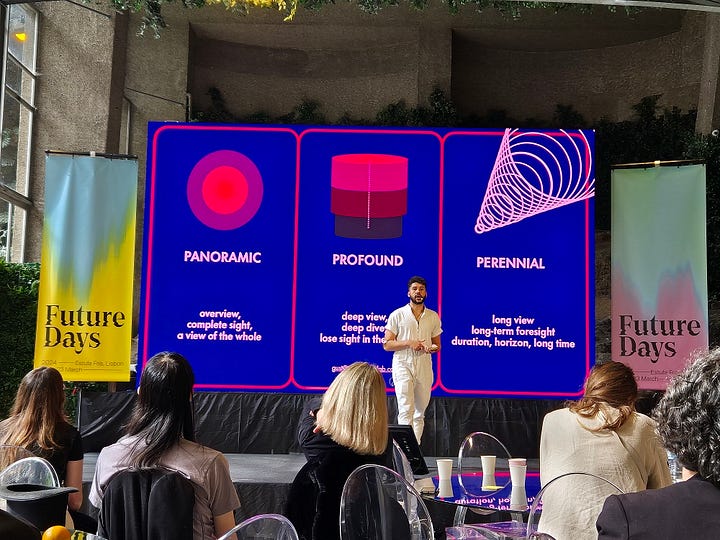
In the first Dialogue of the event, Pau used cartography as a main theme to bring us different perceptions and scales of time and data through centuries, especially to make important decisions. He highlighted what we do with all the information we gather and suggested we create less ‘maps of control’ and more ‘maps of accountability’. I loved how he defined maps as a tool to remember, to conserve what is important beyond a “timeline”.
To close the last Dialogue of Future Labs, Gustavo brought a torus (not only the image but the artifact) to show us time is beyond the clock or the calendar. Quoting Yoruba philosophy (and other great thinkers of our time as Ailton Krenak, Leda Maria Martins, Hartmut Rosa, Giorgio Agamben), he reminded us “we are all events in time, everything is temporal”, and brought us the the origins and horizons paradigm: calling our accountability to our relationship with time and with the world.
… inclusive and equitable-oriented policies, …
Who is not in the house?
This was one of the questions echoing loudly from speakers as Nyangala Zolho, Leila, Eva Xavier, and also from the audience. Highlighting the importance of including voices that weren’t present at this pluricultural but also niched event was an crucial for envisaging equitable futures.
Representation was another key highlight. Leila brought the voice of children and parents, Eva Xavier represented the youth, Nyangala advocated for marginalized voices , showing us how to combine design, data, and future methods to help policymakers more inclusive innovation systems.
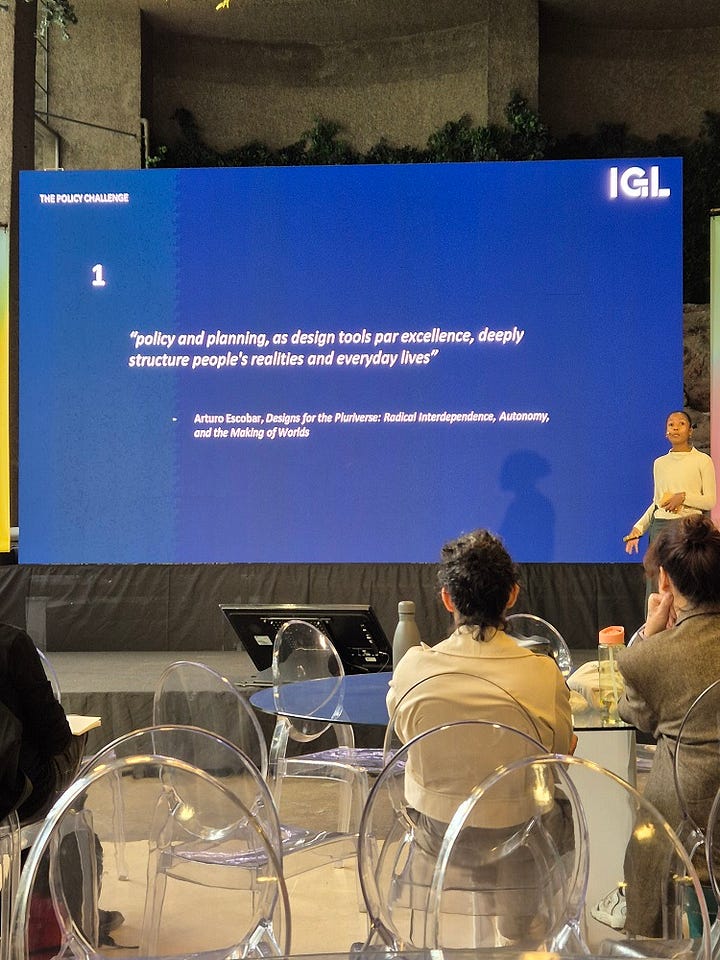
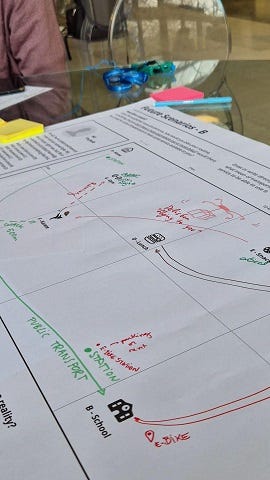
The question proposed by Nyangala “With whom are you learning?” serves as a reminder for all of us to be aware of the biases we carry and to strive for more impactful policy resources. Multiple cultures, ethnicities, genders, people with disabilities, ages, and social backgrounds can bring new ideas to solve the big problems our society and organizations are facing. Challenging the status quo and the lack of representation of multiple groups is crucial for unlocking innovative potential.
In the Grupo Aegeas Portugal’s Lab, our group was invited to explore the commuting routine of a persona in Lisbon and to envision future possibilities for urban transportation with micromobility (public transportation, biking, walking…). We also conceptualized a drone to help our character fetch some food for his son. Considering different cities and the challenges different groups of people face in this scenario encouraged us to examine the biases we hold.
… playful, creative, pluricultural and symbiotic, …
Imagining as a human, and… as a non-human
Overcoming the current crisis of imagination is imperative. I was pleased to hear about the crucial role of imagination one week after the Control to Culture Festival - Radical Imagination that occured here in Brazil. It reinforces my sense of belonging in this chapter of history, which beckons us to awaken our great human ability to strenghthen our accountability to the multiple challenges and barriers we face individually, locally and globally.
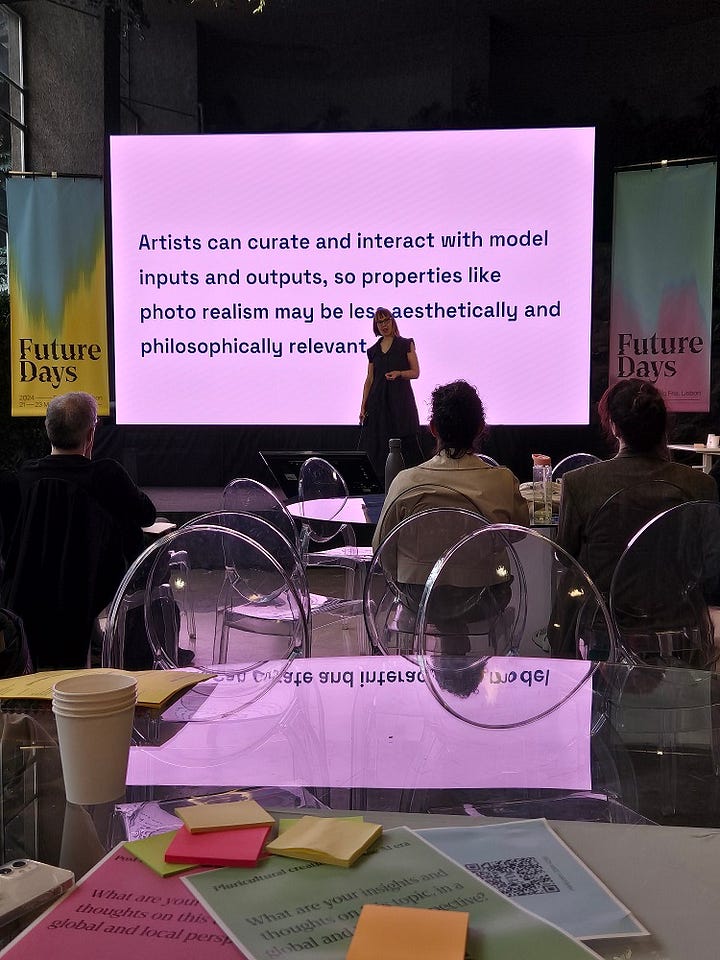

By updating some mythologies of generative AI, Phoenix Perry presented great artistic and creative cases that promote a positive perspective towards ethical and inclusive work in AI, such as The Library of Missing Datasets, Dadabots, Fall of House of Usher, all highlighting the importance of datasets in preventing biases.
Monika Bielskyte inspired us with a radical tenderness approach to finding hope in each other. She offered a critical lens to nostalgia and techno-fetishism, reminding us that “those who control the fantasy control the future”. Therefore, the solution lies not in the dystopia we currently inhabit nor in an exclusionary utopia. She proposes ‘protopia’ as an antidote to fear, a life-centric approach that includes all living beings.
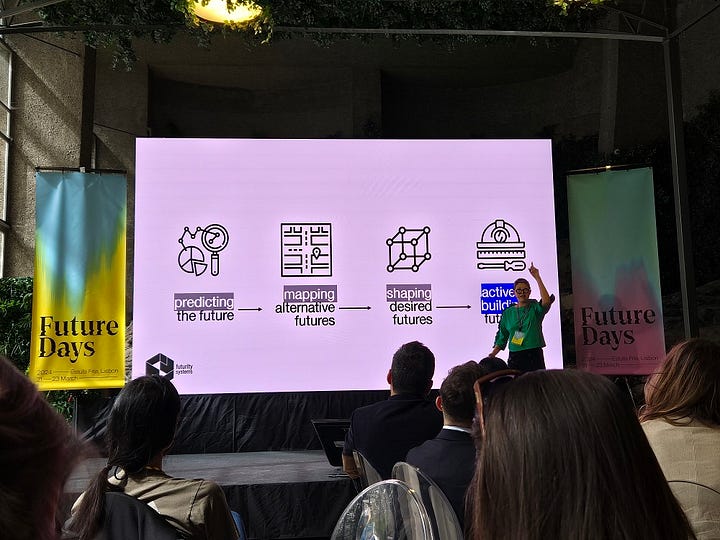
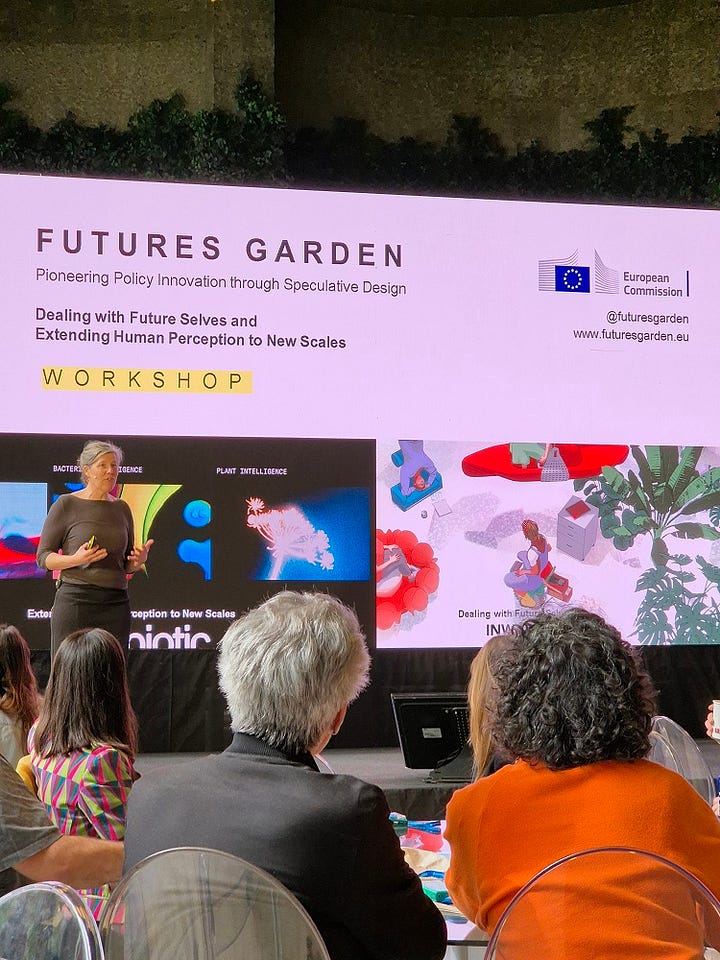
Cecilia Tham also blew minds with a less anthropocentric perspective: presenting plants and fungi as non-human members of society. It was enlightening to hear this alternative perspective on what we commonly refer to as nature or environment. Discussing how to design futures with science, she blended research, creativity, technology, engineering, and AI to make radical imagination tangible. Imagine a future where plants posses self-governance and decision-making capabilities. Wouldn’t things be vastly different? I’d certainly love to meet Herbie, her autonomous creation that starts this plantiverse.
This non-human and symbiotic thinking was also evident in the labs we experienced, such as “The Parliament of Beings”, led by Henrique Nascimento. This lab invited participants to envision futures that included more-than-human perspectives. I had the opportunity to experience “Future Gardens”, led by Erica Bol (thanks for the coffee :)) and Tanja Schindler. They guided us through a reimagining of policy with two provoking artefacts: “Symbiotic future” and “Inwards”. Engaging with theses videos truly expanded my imagination and the brasth of diversity, encouraging me to think from a non-human perspective.
… intersectional and actionable knowledge.
Translating ideas into action
Participative practices and experimental approaches are all about take a seat, trust the design and the people involved. The magic happens when we collectively imagine, share our thoughts, fears, desires, and knowledge. Even when we’re truly present, sharing the same space of thought. The labs and inspiration sessions at Future Days demonstrated how to convert the learning and enchantment from the event into actionable outcomes.
The final wrap up activity challenged groups to gather insights and co-create proposals for real challenges facing Lisbon. Participating in this activity, we tried various tools and methods to envision futures, such as design thinking and backcasting. Our group proposed a new design for smart, decentralized villages to address the infrastructure challenge of aging building in Lisbon. All groups faced a challenge and proposed written, practical actions to a representative of the city council.
In conclusion, translation is a key. If there were one skill paramount for implementing actions in future scenarios, it undoubtedly would be translation. We must enhance our capability to translate our collective thoughts and proposals intro a spectrum of languages to connect with a wide and strategic audience. This effort transcends mere linguistic diversity to include specialized jargons, enabling effective communication with individuals and groups from academia, activism, business, the nonprofit sector, and beyond. Our objective is to forge significant bridges that facilitate actions among all of living beings.
Communication is the act - or the art - of crafting common understanding. I am convinced that translation is the pivotal communication skill that can amplify understanding and enable us to forge plural, shared languages to champion bold and essential changes in the present, ensuring future’s existence.
Last but not least, this text only came about thanks to two encounters: the first with Mariana Jatahy, who opened my eyes to the universe of curation within communication 3 years ago and has encouraged me for over a year to write in English. Thank you for being the first reader and the bridge to the second encounter. With Lydia Caldana, who does incredible work in foresight and is one of the creators of Future Days. Thanks for accepting to have coffee with me last year in Lisbon. :)
Being present at this event was a dream come true. There, I celebrated 8 years of Incipit Hub, my authoral work with communication, curation, and learning. I could hardly imagine that the party would be so great!



Carolina, congratulations on the celebration of 8 years of your authoral endeavor.
It’s clear by the way you generously choose your words, how authentic you are as an individual.
Hope to read more of your thoughts in English. You were captivating on translating this experience to all of us. Thank you!